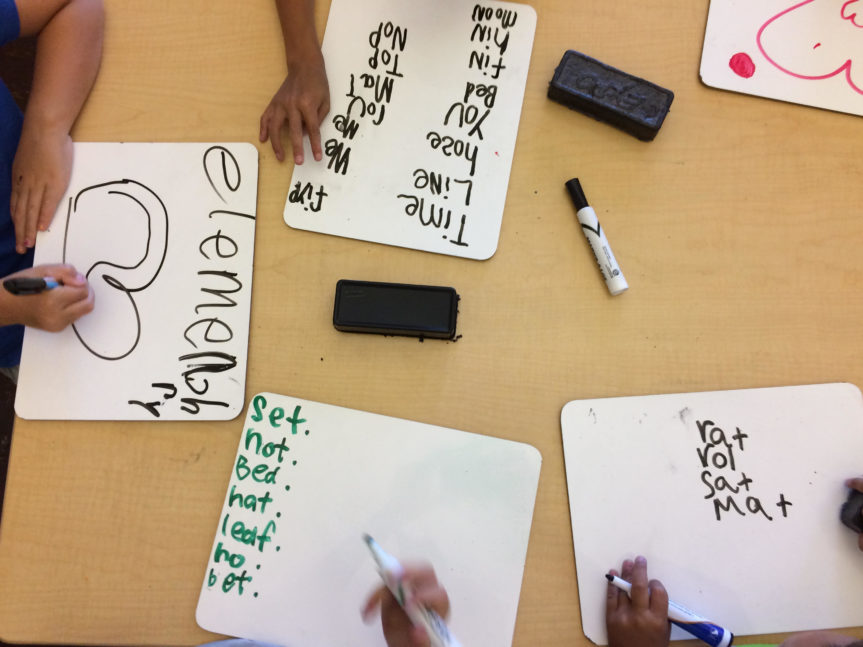By Kristin Burke
Kristin Burke is a TK/K Lead Montessori Teacher at Urban Montessori Charter School in Oakland, California.
I look up at the clock. It is Friday afternoon at 2:40 pm at Urban Montessori Charter School. As I stand and observe small bodies moving with voices exploding in chatter, the tiredness in my body reminds me it’s the last Friday with our students for the 2016-17 school year.
I watch as 30 5- and 6-year-olds in our Primary classroom (Transitional Kindergarten and Kindergarten) tackle math puzzles and games, watercolor, and create with recycled materials.
I walk over to a group of students who had asked to use small whiteboards minutes earlier, and, to my surprise, I am absorbed immediately. As they sit together at a table with dry eraser markers in their hands, one child holds up her white board with words she wrote, looks at the child next to her, and asks confidently, “Which ones rhyme?”
Another child proudly displays his white board, also covered with words, and asks, “Which ones alliterate?”
My body vibrates with new energy as I bend over to look closely at the words they have written, exhilarated that, not only are they practicing rhyming and alliteration, but they are even trying to challenge their peers as they include in the same list words that both alliterate and rhyme. Then, as if continuing the conversation, the students at the table to the right of them, engaged in play dough, burst out singing,
“Letters, Letters, Letters have names, what is the name of this letter?”
And its working. My students have seen huge gains over the course of the year, and by the end of year, over 90% of them have met their literacy targets (data is included at the end).
Learning Literacy with Enthusiasm
Even now, with three more school days to go, I am struck how these students are still embodying with enthusiasm literacy concepts and songs from SEEDS, a program designed to meet and build children’s early literacy and numeracy skills as well as foster their social and emotional development.
SEEDS stands for five core aspects of the program: Sensitivity, Encouragement, Education, Development of Skills Through Doing, and Self-Image Support. SEEDS is not so much a curriculum as it is a framework for deepening early literacy and math foundations.
This past year, Urban Montessori Charter School implemented the SEEDS program, which required that the teachers in our two Primary classrooms use individual, small group, and whole group activities (including Sign in, Daily Message and Interactive Writing, Journaling, Repeated Read Aloud, and Theme Related Centers) to focus daily on the following Big 5 Early Literacy Predictors: oral language/conversation/comprehension, phonological memory and awareness, book and print concepts, alphabetic knowledge, and vocabulary and meaning.
Using Data to Teach for Equity
As I witness my students playing with words, I rush to the other side of the room to get my camera, eager to capture the aliveness of how they are making their learning their own. As I click away, what feels most exciting is that this group of students before me doesn’t “stand out” from the rest of the class, but instead is a snapshot of the steady and growing connections each and every student has made throughout the year.
Not only my students, but I, too, have made new and growing connections. At a deeper level, partnering with SEEDS has been an experience of receiving and giving support. Looking back on the year, I appreciate how participating in the rigorous and systematic SEEDS assessments provided significant support for us teachers and our students.
Three times during the school year (September, December/January, and May) all of us Primary teachers collected and analyzed benchmark data for the areas of Vocabulary, Letter Naming, Rhyming, Alliteration, and Letter Sounds, then selected intervention activities and implemented these interventions daily based on the data. After two to four weeks of small group intervention, progress monitoring was done to check for growth and make instructional decisions based on new data.
Remarkably, at each point of data collection along the way, we were not left alone with the numbers. We studied our results closely in partnership with our SEEDS assigned mentor and had conversations, asked questions, and wondered about our findings with Oakland teacher colleagues during monthly professional development meetings. How remarkable it is, I think to myself, that, within this community of support, nearly all English Language Learners who assessed below grade level at the beginning of the year are ending the school year at or even above the target goal.
The final minutes of the school day come quickly. A child in the classroom rings the bell. Students freeze, clean up, and prepare for dismissal. As the last students head out to the afternoon program, I feel a sense of completeness, a deep gratitude to hear our students’ alliteration and rhyming questions lingering in my mind, fueling my excitement to continue the SEEDS partnership next year.
Here are details of SEEDS assessments at UMCS:
| Area | % at target Beginning yr |
% at target End of yr |
| Vocabulary | 21% | 93% |
| Letter naming | 63% | 98% |
| Rhyming | 58% | 96% |
| Alliteration | 54% | 98% |
| Letter sounds | 38% | 96% |
You can see a previous article on my “pleasantly unsettling” visit to Urban Montessori here.

